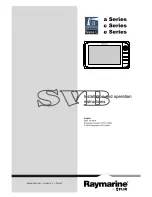
16
W W W . B A L T I M O R E A I R C O I L . C O M . A U
M A R 1 1 3 - 0
In order to control the cycles of concentration such that the above
guidelines are maintained, it will be necessary to “bleed” or “blowdown”
a small amount of recirculating water from the system. This “bleed”
water is replenished with fresh make-up water, thereby limiting the
build-up of impurities.
Typically the bleed is accomplished automatically through a solenoid
valve controlled by a conductivity meter. The conductivity meter set
point is the water conductivity at the desired cycles of concentration and
should be determined by a competent water treatment expert. (Note:
the solenoid valve and conductivity meter must be supplied by others.)
Alternatively a bleed line with a valve can be used to continuously bleed
from the system. (Note: the bleed line and valve must be supplied by
others.) In this arrangement, the rate of bleed can be adjusted using
the valve in the bleed line and measured by filling a container of known
volume while noting the time period. The bleed rate and water quality
should be periodically checked to ensure that adequate control of the
water quality is being maintained.
The required continuous bleed rate may be calculated by the formula.
Bleed rate =
Evaporation rate
(number of cycles of concentration -1)
where the evaporation rate can be determined by one of the following:
1.
The evaporation rate is approximately 1.5 litres/hour for each kW of
operating Total Heat of Rejection (THR).
Example 1: VXC-S with operating THR of 4200kW
Evaporation Rate (l/hr) = 1.5 x 4200 = 6300 l/hr.
Example 2: VXT cools 10 l/s water by 10°C
THR = 4.2 x 10 l/s x 10°C =420kW
Evaporation Rate (l/hr) = 1.5 x 420 = 630 l/hr.
2.
VXT & VXI-S Only
The evaporation rate in litres/hour = 6.3 x range (°C) x water flow (l/s)
Example: A VXI-S cools 10 l/s water by 10°C
Evaporation rate (l/hr) = 6.3 x 10 x 10 = 630 l/hr.
Note: for VXI-S water flow is the flow through the coil
Bleed Off







































